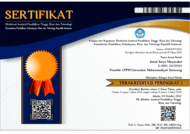Peningkatan Kompetensi Guru di Sekolah Menengah Islam Ihsanul Fikri melalui Pelatihan Pengembangan Media Pembelajaran Berbasis Kecerdasan Buatan: Sebuah Studi Mixed-Methods
(1) Universitas Muhammadiyah Semarang
(2) (Scopus ID: 57204172803) - Department of Informatics, Faculty of Engineering, Universitas Muhammadiyah Semarang, Semarang
(3) Universitas Muhammadiyah Semarang
(4) Universitas Muhammadiyah Semarang
(5) Universitas Muhammadiyah Semarang
(6) Universitas Muhammadiyah Semarang
(7) Universitas Muhammadiyah Semarang
(8) Universitas Muhammadiyah Semarang
(9) Universitas Muhammadiyah Semarang
(10) Universitas Muhammadiyah Semarang
(11) Universitas Muhammadiyah Semarang
(12) Universitas Muhammadiyah Semarang
(13) Universitas Muhammadiyah Semarang
(14) Universitas Muhammadiyah Semarang
(*) Corresponding Author
Abstract
The training program on Artificial Intelligence-based Learning Media Development (P3MP-AI) represents a strategic initiative to enhance the quality of education at the Ihsanul Fikri Integrated Islamic High School. In the rapidly evolving landscape of information technology, the integration of Artificial Intelligence (AI) technology into education has become an urgent necessity. This endeavor aims to address the personalized learning needs, overcome human resource and time constraints, and enhance the overall quality of education in achieving educational goals. Through the Active and Interactive Learning Method (MPB-AI) approach, educators engage in various practical and interactive activities, enabling them to comprehend and applykecerdasan buatanconcepts practically. Evaluation of this training program demonstrates significant achievements in enhancing participants' understanding and skills, as well as a high level of creativity and diversity in AI-based learning media development practices. Thus, this training program has successfully achieved its objectives in improving the quality of education at the Ihsanul Fikri Integrated Islamic High School. Recommendations for future activities include extending the duration of implementation for optimal goal attainment and developing similar activities periodically to continually enhance educators' abilities in delivering more effective and efficient learning experiences.
Keywords
Full Text:
PDFReferences
Braun, V., & Clarke, V. (2006). Using thematic analysis in psychology. Qualitative Research in Psychology, 3(2), 77–101. https://doi.org/10.1191/1478088706qp063oa
Chen, L., Chen, P., & Lin, Z. (2020). Artificial Intelligence in Education: A Review. IEEE Access, 8, 75264–75278. https://doi.org/10.1109/ACCESS.2020.2988510
Chen, L., Chen, P., & Lin, Z. (2020). Artificial Intelligence in Education: A Review. IEEE Access, 8, 75264–75278. https://doi.org/10.1109/ACCESS.2020.2988510
Creswell, J. W., & Inoue, M. (2025). A process for conducting mixed methods data analysis. Journal of General and Family Medicine, 26(1), 4–11. https://doi.org/10.1002/jgf2.736
Espino-Díaz, L., Alvarez-Castillo, J.-L., Gonzalez-Gonzalez, H., Hernandez-Lloret, C.-M., & Fernandez-Caminero, G. (2020). Creating Interactive Learning Environments through the Use of Information and Communication Technologies Applied to Learning of Social Values: An Approach from Neuro-Education. Social Sciences, 9(5), 72. https://doi.org/10.3390/socsci9050072
Jia, N., Luo, X., Fang, Z., & Liao, C. (2024). When and How Artificial Intelligence Augments Employee Creativity. Academy of Management Journal, 67(1), 5–32. https://doi.org/10.5465/amj.2022.0426
Joksimovic, S., Ifenthaler, D., Marrone, R., De Laat, M., & Siemens, G. (2023). Opportunities of artificial intelligence for supporting complex problem-solving: Findings from a scoping review. Computers and Education: Artificial Intelligence, 4, 100138. https://doi.org/10.1016/j.caeai.2023.100138
Lindner, A., & Berges, M. (2020). Can you explain AI to me? Teachers’ pre-concepts about Artificial Intelligence. 2020 IEEE Frontiers in Education Conference (FIE), 1–9. https://doi.org/10.1109/FIE44824.2020.9274136
Lindner, A., & Berges, M. (2020). Can you explain AI to me? Teachers’ pre-concepts about Artificial Intelligence. 2020 IEEE Frontiers in Education Conference (FIE), 1–9. https://doi.org/10.1109/FIE44824.2020.9274136
Mishra, P., & Koehler, M. J. (2006). Technological Pedagogical Content Knowledge: A Framework for Teacher Knowledge. Teachers College Record: The Voice of Scholarship in Education, 108(6), 1017–1054. https://doi.org/10.1111/j.1467-9620.2006.00684.x
Muthmainnah, Ibna Seraj, P. M., & Oteir, I. (2022). Playing with AI to Investigate Human-Computer Interaction Technology and Improving Critical Thinking Skills to Pursue 21st Century Age. Education Research International, 2022, 1–17. https://doi.org/10.1155/2022/6468995
Puentedura, R. R. (2014). SAMR and Bloom´s Taxonomy: assembling the puzzle. Commonsense. https://www.commonsense.org/education/articles/samr-and-blooms-taxonomy-assembling-the-puzzle
Puentedura, R. R. (2020). SAMR, Observation, Analysis, and Action. Hippasus. http://hippasus.com/blog/
Puentedura, R. R. (2006). Transformation, technology and education. Hippasus. http://hippasus.com/resources/tte/
Roll, I., & Wylie, R. (2016). Evolution and Revolution in Artificial Intelligence in Education. International Journal of Artificial Intelligence in Education, 26(2), 582–599. https://doi.org/10.1007/s40593-016-0110-3
Seo, K., Tang, J., Roll, I., Fels, S., & Yoon, D. (2021). The impact of artificial intelligence on learner–instructor interaction in online learning. International Journal of Educational Technology in Higher Education, 18(1), 54. https://doi.org/10.1186/s41239-021-00292-9
Seo, K., Tang, J., Roll, I., Fels, S., & Yoon, D. (2021). The impact of artificial intelligence on learner–instructor interaction in online learning. International Journal of Educational Technology in Higher Education, 18(1), 54. https://doi.org/10.1186/s41239-021-00292-9
Article Metrics
Abstract view : 95 timesPDF - 31 times
DOI: https://doi.org/10.26714/jsm.7.2.2025.207-214
Refbacks
- There are currently no refbacks.
Copyright (c) 2025 Jurnal Surya Masyarakat

Jurnal Surya Masyarakat (JSM) is licensed under Creative Commons Attribution-NonCommercial-NoDerivatives 4.0
------------------------------------------------------------------------------------------------------------------------
Jurnal Surya Masyarakat (JSM)
p-ISSN: 2623-0364; e-ISSN: 2623-0569
Published by: Lembaga Penelitian dan Pengabdian Masyarakat (LPPM) Universitas Muhammadiyah Semarang



.jpg)







.jpg)